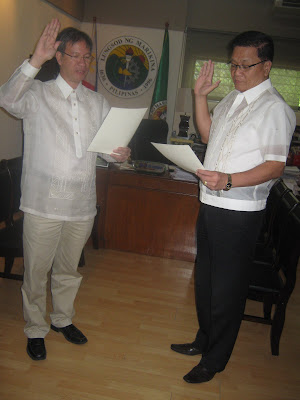Guest Post by Oj Cruz
 Photo by Ada Cañas, GMA News Library
Photo by Ada Cañas, GMA News Library
People I meet, after the perfunctory introductions are made, are usually surprised to find out I am a librarian. Reactions range from the demure "oh," with a slight twitch of the left facial muscles, to the "oh-no-you're-not," delivered with an abrupt plunge in tone of voice; skin slowly turning pale. Kidding aside, people I meet for the first time are genuinely interested why a young man in his 30s (because 30 is the new 20, haha) seriously considered and made a career out of being a librarian. A Librarian. Not Information Manager, Information Specialist, Information Analyst, or any other incarnation of the basic title of the profession available on the Internet nowadays.
Why become a librarian? Why not a career in the arts or media, as befits my online persona or my gregarious self when in the company of close friends? I cannot claim that librarianship as a career path came to me like lightning-amidst-storm-clouds, an epiphany, or a mid-morning realization. No, it didn't. In fact, who would choose a career that upon mention will instantly fill one's head with images of old maids shushing the life out of unruly high school teens? LOL. Never in my wildest dreams; but it happened, one thing led to another—and now I’m all the more thankful for it.
My life as an undergraduate Iskolar ng Bayan was mired with trials, hardships, and tribulations along the way in the form of 5.0s, 3.0s, INCs, and occasional sleepless nights on account of a paper, a report, or both. (It happens to most; not that I have a very unique life story in UP, haha!) I ended up, like most of us did back then (late 90s), at the steps of the UP School of Library and Information Studies, begging to be given another shot at UP Life. The shot was given, indeed, and before long I found myself poring over books on library history, cataloging and classification, indexing and abstracting, management, reference service, and information technology—all of those on top of the general education subjects that one has to pass in order to graduate with a UP degree. No, my friends, Librarianship as an undergraduate course is not the easy way to a UP degree; but since a chance was given, I had to prove myself worthy of the challenge. I toiled and worked hard, understanding the concepts and applying them in various exercises designed to mold us into future information professionals.
One might say that I was thrust right in the middle of the action. I was like a fish out of water; still relishing my old life back in my old college that I left for this new one—my head still filled with dreams of what-could-have-been. But despite the situation, I kept an open mind, welcomed the different possibilities that this change might bring about. As semesters wore on and my study habits gradually improved, so did my grades begin to finally pick up. I eventually realized that maybe this "abrupt change" was not so abrupt after all, that maybe an unseen guiding hand was leading me through all of this. How else can one explain the series of events that led me to the doorsteps of the UP SLIS—Mass Comm's period of application for shifting closing right exactly as I was still trying to argue my case with them; myself at the very end of my two-semesters-allowed "non-major" status; and only 3 colleges left open that were still accepting shiftees into their fold (CAL, SLIS, and CSWD). Having had a prior theater audition gone awry, and not really seeing myself as a convincing social worker, I took the best option available. And the rest was history.
Looking back, having had a good one year solid run with GMA Network as one of its news librarians, and followed by an 11-year stint (and counting) with the Senate as a Legislative Staff Officer in the Library, I can say I have had a professionally rewarding 12 years of practice as a librarian. Armed with a degree in Library and Information Science and the approval of the PRC's Board for Librarians to practice Librarianship, I was able to help shape public opinion (at GMA) and help craft relevant pieces of legislation that affect the country's future (in the Senate) in my own little way, by providing the much needed information at the right time.
As libraries continue to prove themselves valuable both in the corporate world and in government, as go-to-places for research, so too, do I find myself thriving. With every question posed to me—a legislative history of a Republic Act, a profile of a senator, a book on the constitution—I discover my inner child again; that child who relished finding new discoveries. For in every page of a book I read, history is discovered. Even the most mundane of trivia interests me. My stint covering the various quiz bees during my elementary years can attest to that; the love of information for the sake of information itself. Why, looking back I was already making lists and inventories of children's books I owned when I was in elementary; color-coding the covers of my fiction books back in high school, haha!
So yeah. It was not an epiphany, a mid-morning realization, or even a lightning-amidst-storm-clouds type of recognition back in college, that I wanted to be a librarian. Looking back, it was something more than that. Call it Divine Providence, if you want, a profound-accident-of-sorts, or maybe just a stroke of luck.
I call it Tadhana.
Read More...
Summary only...


























